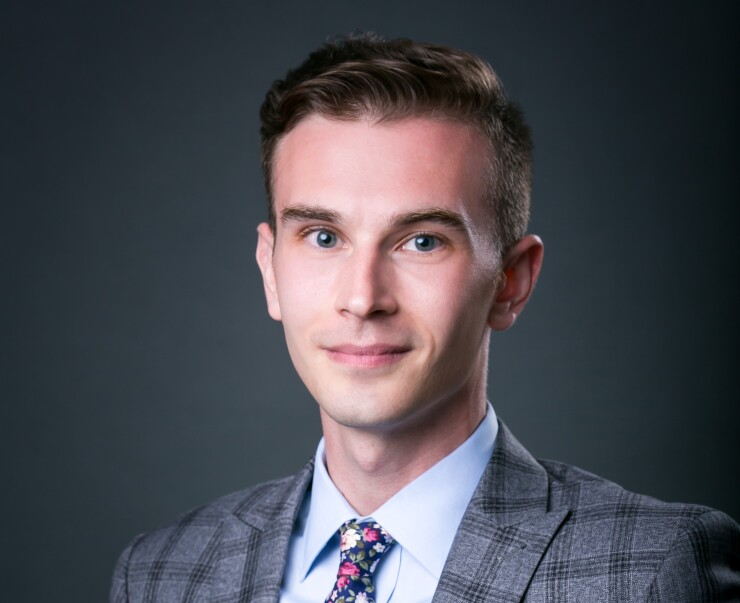Though public finance has networking groups based on gender and ethnicity, it lacked one for members of the LGBTQ community.
Three San Francisco-based industry leaders decided to bridge that gap in 2019 by forming California Muni Pride, a public finance networking group for people who identify as lesbian, gay, bisexual, transgender or queer.
The group has since grown to include about 25 members.
“A lot of focus with affinity groups has been on gender and ethnicity,” said Roberto Ruiz, a managing director at Stifel Financial Corp.
“We observed there was a gap in the industry — one that would have brought awareness of the LGBTQ community. So, rather than wait for it, we decided to do something about it,” said Alexander Vaisman, managing vice president for the West region and head of the national higher education practice at Build America Mutual.

Ruiz, Vaisman and Luke Brewer, a debt specialist in the controller’s Office of Public Finance at the City and County of San Francisco, are the founders of Muni Pride.
The group formed several months before a significant U.S. Supreme Court ruling in June 2020 when the high court affirmed that LGBTQ workers are protected from discrimination under the Civil Rights Act of 1964.
At Stifel and BAM, Ruiz and Vaisman say they have each found a supportive environment, where they are comfortable being openly gay.
The companies have supported the networking organization by sponsoring happy hour events.
“When I told my manager about launching this group, the reception was positive right from the get-go,” Vaisman said. “There was a lot of support. Not just, this is a great idea, but in offering to financially support events by sponsoring them.”
Ruiz sees networking groups as being important, because they helped him “feel like I fit in,” he said.
“I think back to when I started in the industry and there was a feeling of being really isolated,” Vaisman said. “We don’t want it be a question that there is a community out there. We want folks to know there are people you could come to, because sometimes that support doesn’t exist in the organization.”

Networking groups, on their own, aren’t enough to combat discrimination, but Vaisman said they’re a step in the right direction.
“Oftentimes there is strength in numbers,” Vaisman said. “In and of itself, it’s not the answer, but it can be part of the equation in working toward change.”
“I think my ability to do well had a lot to do with the welcoming atmosphere and acceptance of my colleagues,” Ruiz said.
According to a 2019
McKinsey, which has been following the trajectories of hundreds of companies since 2014, found that the companies who have embraced ethnic, gender and cultural diversity by adopting systematic, business-led approaches to inclusion perform better.
“Our latest analysis reaffirms the strong business case for both gender diversity and ethnic cultural diversity in corporate leadership — and shows that this business case continues to strengthen,” the McKinsey authors wrote.
Companies in the top quartile for gender diversity on executive teams were 25% more likely to have above-average profitability than companies in the fourth quartile, according to the McKinsey report. Companies in the top quartile for having ethnic and culturally diverse leadership outperformed those in the lowest quartile by 36% in profitability.
“Your identity, sexual orientation, or what is unique about you, shouldn’t prohibit you from succeeding in the industry,” Vaisman said.
Vaisman, who started in BAM’s New York office, said he was “out” on day one, but added he felt more comfortable speaking openly about his husband because he worked with other people who were open about being gay at the company and were successful.

“I had the same experience at my firm of having supportive colleagues,” Ruiz said.
The duo note that their experience might not be commonplace, because they work in San Francisco and New York.
“Our experience is not universal,” Ruiz said. “Our focus has been California, but we are looking forward to expanding throughout the rest of the country.”
First, they want to help start new chapters in California, Ruiz said.
The trio have reached out to the other public finance-focused affinity groups including the leadership of Women in Public Finance for advice on how to expand the network. They have also spoken on diversity-themed panels to help get the word out, but concede that most of the growth has come through word of mouth.
“One of the bright spots has been how incredibly supportive other affinity industry groups have been,” Vaisman said. “They have helped us to develop as an organization.”
Ruiz and Vaisman said they also received calls from people about the group after
Though the COVID-19 pandemic had slowed what they had hoped would be in-person meetings, it also enabled them to include people throughout the state, as the pandemic drove gatherings online.
“We realized technology has positive and negative factors,” Vaisman said. “It is easier to connect with others across geographic boundaries, but we are eager to see folks in person.”
Technology could help build a pathway to create a critical mass and establish similar groups throughout the country, Vaisman said.





